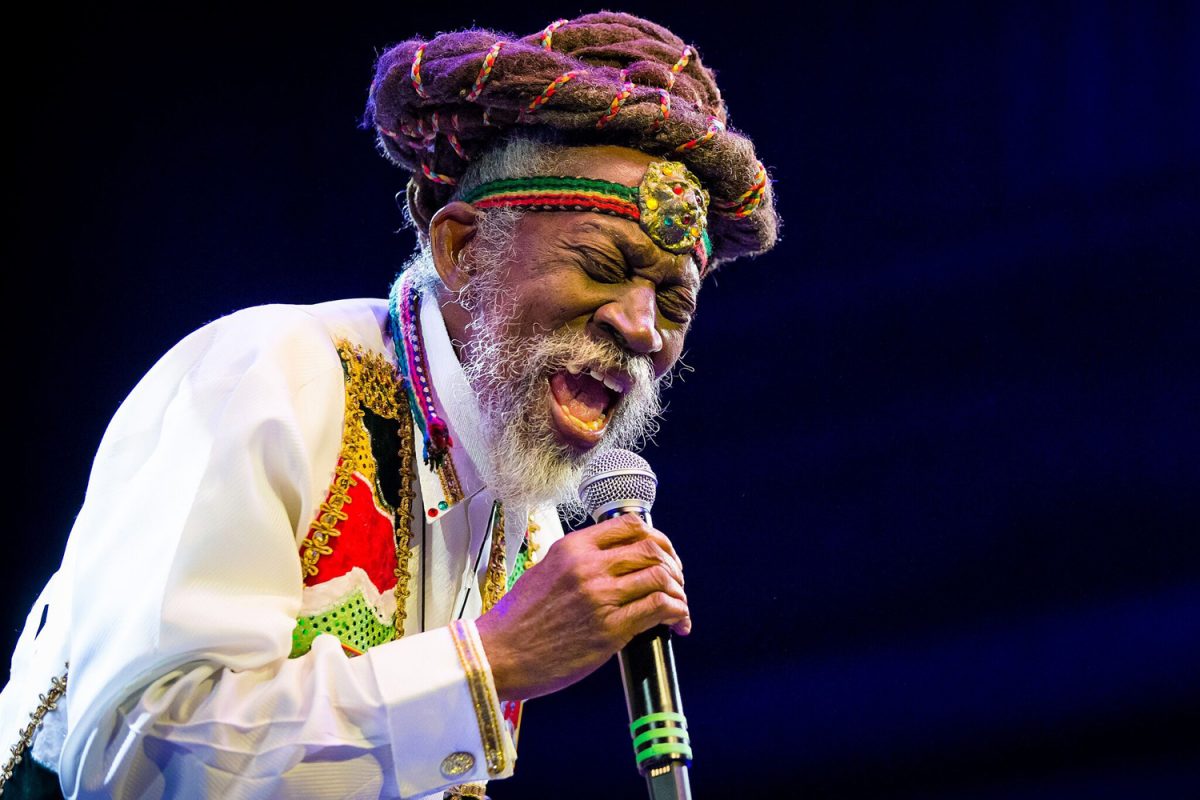Bunny Wailer: The Man, The Myth, The Legend

“Behold, how good and how pleasant it is for brethren to dwell together in unity! It is like the precious ointment upon the head,… as the dew that descended upon the mountains of Zion: for there the most high Jah… Rastafari… commanded his blessings, that I and I shall not die, but live , Jaaahh”. These were words of The Original Wailer, Bunny, Neville O’Riley Livingston, quoting Psalms 133, as he calmed the roaring crowd at his 1986 Madison Square Garden concert.
With twenty-eight solo albums and eight compilations and EP, Bunny is a three-time solo Grammy award winner for Time Will Tell: A Tribute to Bob Marley (1991), Crucial! Roots Classics (1995), Hall of Fame: A Tribute to Bob Marley’s 50th Anniversary (1997).
His legacy is forever tied to the roots of Bob Marley and the original Wailers, the most successful reggae group in the world. However, his relationship with Bob Marley predated the forming of the group. Both of their parents Thaddeus Livingston, Bunny’s father and Cedella Booker, Marley’s mother, had an intimate relationship. They were raised in the same home in West Kingston where they met the third member of the Wailers, Peter Tosh as part of a recruitment drive to form a band.
Livingston said, “..in 1961 there was a recruitment of the Wailers from the community of Trench Town”. He expressed in a 2011 YouTube interview that it was a challenge to find the final members for the group because there were many talented candidates from the community.
It was his ability to find harmony with the group, that saw him becoming a founding member. Not long after they formed the original Wailers that they set out to record their hit Trench Town Rock.
As a group, they spread the music of Rastafarian power and spirituality to become singers who stamped their mark on the music business forever.
As a solo artist, Wailer adopted the name “Bunny” and became more than just a roots reggae artist. He re-recorded songs he did with the Wailers group and experimented with different sounds including disco, and dancehall.
Mutabaruka, in commenting on Bunny’s life said that, “Bunny Wailer’s music is a testimonial to the victory of the Rastafari movement that suffered much persecution in Jamaica in the 1960s and 1970s.”
The song and album The Blackheart Man are viewed as classics within the reggae community and have been a blueprint for many later day reggae hits by artists like Barrington Levy, Black Roots, Norrisman, Reggae Rude Boys, Chronixx and others. Championing the cause of the marginalized in societies all over the world, the lyrics give early context to the Rastafarian community.
Blackheart Man is about the marginalization and struggle experienced by the rasta community as Bunny describes as a mythical mystical figure , “The Blackheart Man, don’t go near him for even Lions fear him…he lives in the gullies of the city, even in the lonely parts of the country he is the Blackheart man, he lives just like a Gypsy… he has become the wonder of the city”.
The song goes on, “I got common sense and learned that everything is created equal under the sun and wisdom is found in the simplest of place in the knick of time/ now I trod the same road of affliction just like the black heart man, getting my share of humiliation just like the Blackheart Man”
Rasta’s were viewed with skepticism by society and chastised by the authorities. Bunny Wailer lived in a time when persons were persecuted in Jamaica for simply smoking Marijuana and he made his music a reflection of the times. He had to spend time in prison for smoking marijuana and it was during that time he wrote the hit Battering Down Sentence. Lamenting how much he was fighting all day long to get out of his circumstances. “I pray the day will come when I shall be free”.
The reggae superstar’s solo catalogue was not all about trying times, however. Some of his biggest songs are Cool Runnings and R ock ‘N Groove. One of his biggest cross-cultural hits is Electric Boogie — a song he wrote, and a version sung by Marcia Griffiths, which climbed the Billboard Hot 100 chart to number 51 in 1990 and has been the traditional barbeque jam ever since.
He had many sold-out concerts including the groundbreaking one at Madison Square Garden New York, in 1986. His final concert tour was in 2016 marking the 40th anniversary of the Blackheart Man which made its final stop at BB Kings in New York City where he had not performed in twenty-five years.
“Behold, how good and how pleasant it is for brethren to dwell together in unity!It is like the precious ointment upon the head,…as the dew that descended upon the mountains of Zion: for there the most high Jah… Rastafari…commanded his blessings, that I and I shall not die, but live , Jaaahh”. Sound the drums for the life and legacy of The Original Wailer, Bunny, Neville O’Riley Livingston.
Bunny Wailer is the Blueprint for reggae music and his legacy should be celebrated for all generations.
Email: worldmusicviews@gmail.com
